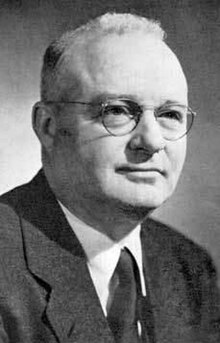Thomas Midgley, Jr.
| Dr. Thomas Midgley Jr. | |
|---|---|

Midgley, c. 1930s–1940s
|
|
| Born |
May 18, 1889 Beaver Falls, Pennsylvania, US |
| Died | November 2, 1944 (aged 55) Worthington, Ohio |
| Nationality | American |
| Fields | |
| Alma mater | Cornell University |
| Known for | |
| Notable awards |
|
Doctor Thomas Midgley Jr. (May 18, 1889 – November 2, 1944) was an American mechanical engineer and chemist. He was a key figure in a team of chemists, led by Charles F. Kettering, that developed the tetraethyllead (TEL) additive to gasoline as well as some of the first chlorofluorocarbons (CFCs). Over the course of his career, Midgley was granted over 100 patents.
Midgley was born in Beaver Falls, Pennsylvania, to a father, Thomas Midgley, who was also an inventor. He grew up in Columbus, Ohio, and graduated from Cornell University in 1911 with a degree in mechanical engineering.
Midgley began working at General Motors in 1916. In December 1921, while working under the direction of Charles Kettering at Dayton Research Laboratories, a subsidiary of General Motors, Midgley discovered that the addition of Tetraethyllead to gasoline prevented "knocking" in internal combustion engines. The company named the substance "Ethyl", avoiding all mention of lead in reports and advertising. Oil companies and automobile manufacturers, especially General Motors which owned the patent jointly filed by Kettering and Midgley, promoted the TEL additive as a superior alternative to ethanol or ethanol-blended fuels, on which they could make very little profit. In December 1922, the American Chemical Society awarded Midgley the 1923 Nichols Medal for the "Use of Anti-Knock Compounds in Motor Fuels". This was the first of several major awards he earned during his career.
...
Wikipedia
